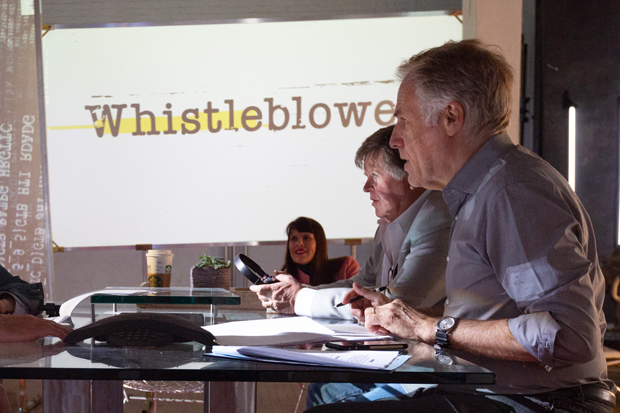Shining a light on those who speak truth to power
In a new television series, Allen Alter ’71 helps shed a spotlight on people seeking to expose injustice
 Photo/Austap Wolfgang
Photo/Austap WolfgangBrandeis Trustee Allen Alter ’71 spent more than three decades at CBS News in many high-profile television production roles, but he says his latest endeavor, “Whistleblower,” which premiered on July 13, is a project like no other.
Alter serves as the senior coordinating producer for the series, which is eight hour-long episodes that mostly feature two separate stories about individuals who have attempted to expose injustice in companies engaged in illegal and sometimes dangerous wrongdoing. According to Deadline Hollywood, audiences responded well - with more 3.07 million viewers tuning in to the first episode.
BrandeisNOW spoke with Alter to learn more about “Whistleblower” and his role on the production team.
BrandeisNOW: Allen, you’ve been at CBS for 33 years, but is there something that excites you most about this new project?
Allen Alter’71: What’s fascinating is that these are very impactful stories that, for the most part, people don’t know about. These stories involve ordinary John and Jane Does. They’re your average friend, relative, and neighbor who have seen something amiss where they work and have decided they’re going to do something about it. They become a whistleblower.
Many are quite heroic in what they do throughout this process. Once a case is accepted by the government, it’s under seal. That means persons who bring about legal action can’t discuss the case with anyone but a lawyer. They can’t talk about it to a spouse, a relative, or a friend. It adds a significant burden to people going through the process.
BNOW: “Whistleblower” spotlights people who speak truth to power at great risk. Can you discuss the implications of what’s at stake?
Alter: Most people who bring about these cases lose their jobs, so they lose their income, get blacklisted from their industry, and in some cases lose their homes. One person was forced to live in a homeless shelter with his children, doing menial tasks to make money.
When they file suit, the whistleblower is briefed by their lawyers on what’s involved though not everyone can totally fathom the extent of isolation and personal toll, because no one knows in advance if a case will be decided in two years, five years, or, as it happened in one particular case, 17 years. You might say you want to go through the process, but you don’t know at the start how it will affect you emotionally, or that there’s no guarantee there will be an outcome in your favor. It’s a huge risk for these people to become whistleblowers.
BNOW: Across the country, we see reputable news organizations slashing budgets and cutting back on investigative reporting, while journalists at large are increasingly under fire for their credibility. That said, what does it mean for CBS to be covering the stories in “Whistleblower”?
Alter: I don’t think this kind of series has ever been on television, especially in this form. It’s especially important, in today’s culture and society, for these stories to be told. People need to know the avenue or approach for seeking real justice for things they perceive to be wrong.
We refer to these stories as tales of David versus Goliath because the individual, oftentimes, is going against a corporation or a big company. You have to have a certain moral fiber and a willingness to go the extra mile to become a whistleblower. Sometimes, I think whistleblowers are depicted negatively. However, I think the people in this series are heroes for what they’ve done, even when the outcome isn’t always what they'd hoped.
BNOW: Given that you graduated from Brandeis, where the pursuit of social justice is embraced by the community, what was it like to see social justice at work through the people you highlighted in “Whistleblower”?
Alter: This series is really about an aspect of social justice. Knowing how relevant and important that is as a pillar of Brandeis gives me a lot of pride to be associated with this kind of project.
I’m hoping “Whistleblower” has a big impact on people’s lives. It’s gratifying to see the details of these stories where people who had strong moral compasses and decided to act on them were rewarded for what they thought was the right thing. No one goes into this thinking they’ll be financially rewarded. It’s about the moral reward and getting justice in the end.
In most cases featured, there may be a positive outcome. But it’s a risk you take when you become a whistleblower. With morality and social justice in mind, these people are willing to take a risk.
Allen Alter ’71 is the former President of the Brandeis Alumni Association and a member of the Brandeis University Board of Trustees.





